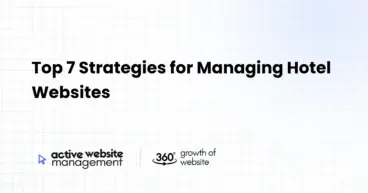December 19, 2024
8 min read
As an entrepreneur, you may already know how crucial it is to have a website for your business. Whether you’re a startup or an established brand, your website acts as the digital face of your business. However, managing a website efficiently goes beyond simply having a site up and running. From web design to content creation and maintenance, website management can be overwhelming, especially for beginners.
In this comprehensive guide, we’ll walk you through the essentials of managing your website, covering everything from the basics of website development to advanced strategies for active website management. Whether you’re launching a brand-new site or maintaining an existing one, you’ll find actionable tips and strategies to enhance the user experience, improve performance, and increase your online visibility.
1. What is Website Management?
Website management involves the ongoing processes of maintaining and updating a website to ensure that it operates smoothly and delivers a high-quality user experience. It covers a broad range of activities, including web design, content updates, performance optimization, security measures, and troubleshooting technical issues.
For entrepreneurs, effective website management is essential because it ensures that your website meets the needs of your target audience, performs well in search engines, and stays secure against potential cyber threats. It’s not just about setting up a website and letting it run on its own—it’s about continuous improvement and adaptation to new trends and technologies.
2. Why Website Management is Important for Entrepreneurs
As a business owner, your website is often the first point of contact with potential customers. In fact, research suggests that 75% of users judge a company’s credibility based on the design of its website. Here are some reasons why effective website management is important for entrepreneurs:
- Customer Trust and Engagement: A well-managed website creates a positive impression, builds trust, and encourages visitors to engage with your content or make a purchase.
- Improved SEO and Visibility: Regularly updated websites tend to perform better in search engine rankings, making it easier for potential customers to find you online.
- Competitive Advantage: A well-maintained, fast, and user-friendly website gives you a competitive edge over other businesses in your industry.
- Enhanced User Experience (UX): Managing your website actively helps you provide an excellent user experience by ensuring your site is easy to navigate, loads quickly, and functions properly on all devices.
- Increased Conversion Rates: A properly managed website with clear calls-to-action, intuitive design, and valuable content helps convert visitors into customers, subscribers, or leads.
3. Essential Components of Website Management
To effectively manage your website, it’s crucial to understand the core components that make up the management process. Below, we break down the essential elements that every entrepreneur should focus on.
Don’t Just Maintain Your Website—
Grow It using Active Website Management! Don't Wait for Growth—Accelerate It with Active Website Management
Web Design and User Experience (UX)
Good web design is the foundation of a successful website. Your site should be visually appealing, easy to navigate, and mobile-friendly. The design should align with your brand’s identity, providing a seamless experience for users regardless of their device or screen size.
Key Design Elements to Focus On:
- Responsive Design: Ensure your website looks good and functions well on desktops, tablets, and smartphones.
- Clear Navigation: Your website’s menu and structure should be easy to understand. Make it simple for visitors to find what they’re looking for.
- Visual Appeal: Use high-quality images, fonts, and colors that complement your brand’s aesthetic and enhance the user experience.
- Consistent Branding: Your site’s design should reflect your company’s values, mission, and unique selling points.
Content Creation and Optimization
Content is king when it comes to website management. Regularly creating high-quality, relevant content helps keep visitors engaged and provides value to your target audience. Additionally, optimizing your content for search engines (SEO) ensures that your site ranks higher in search results, driving more traffic to your business.
Content Tips:
- Blog Posts and Articles: Regularly update your blog with relevant, informative articles that address the pain points and interests of your audience.
- Product Pages: Make sure your product or service pages are well-written, informative, and optimized for conversions.
- SEO Best Practices: Include relevant keywords in your titles, headings, and body text to improve visibility. Use tools like Google Analytics and Google Search Console to track performance.
A slow-loading website is a major turn-off for users and can significantly impact your conversion rates. Google also considers website speed as a ranking factor, so improving your site’s performance is essential for both user experience and SEO.
Tips for Improving Website Speed:
- Optimize Images: Compress images without sacrificing quality to reduce load times.
- Use Caching: Implement browser caching and server-side caching to speed up page loading times.
- Choose a Reliable Hosting Provider: Invest in a reputable web hosting service that offers fast servers and excellent customer support.
- Minimize HTTP Requests: Reduce the number of elements on your web pages, such as scripts, stylesheets, and images.
For more on optimizing website speed, read our detailed article on speed up your website.
Security and Maintenance
Website security is an often-overlooked but critical aspect of website management. An insecure website can lead to data breaches, malware infections, and loss of customer trust. Regular maintenance is also essential to keep your website up-to-date and functioning smoothly.
Key Security Tips:
- SSL Certificate: Ensure that your website uses HTTPS to encrypt user data.
- Regular Backups: Schedule automatic backups to prevent data loss in case of an issue.
- Software Updates: Keep your website’s CMS, plugins, and themes up-to-date to avoid vulnerabilities.
- Firewalls and Security Plugins: Use security plugins or firewalls to prevent hacking attempts.
4. Active Website Management Practices
Active website management goes beyond just maintaining your site. It involves regularly engaging with your audience, making updates, and constantly improving your site to meet the changing needs of your customers and the market.
Regular Content Updates
Search engines favor websites that regularly update their content. Fresh, relevant content signals to Google that your site is active and authoritative. It also keeps your audience engaged and coming back for more.
User Engagement and Feedback
User engagement is crucial for keeping visitors on your site longer. This includes having clear calls-to-action, interacting with users through comments or chat features, and gathering feedback to improve your website.
- Surveys and Polls: Use surveys to collect feedback on your website’s user experience.
- Live Chat: Offering a live chat feature can provide real-time customer support and increase engagement.
SEO Management
SEO is an ongoing process, and to stay competitive, you need to monitor and tweak your SEO strategy regularly. Track keywords, analyze competitors, and update your content based on the latest SEO trends and algorithm changes.
5. Common Website Management Challenges and How to Overcome Them
While managing a website can be a rewarding experience, it does come with its challenges. Here are some common obstacles entrepreneurs face and how to overcome them:
Don't Wait for Growth—Accelerate It with
Active Website Management Don't Wait for Growth—Accelerate It with Active Website Management
Time and Resource Constraints
Managing a website takes time and resources, especially for small businesses. If you don’t have the bandwidth to handle it yourself, consider using a content management system (CMS) like WordPress or hiring a part-time webmaster.
Keeping Up with Technology
The digital landscape evolves rapidly, and it can be difficult to keep up with the latest trends and technologies. Invest in continuous learning, attend webinars, and stay updated with industry news to stay ahead of the curve.
There are several tools available that can help you manage and optimize your website. Here are some popular ones:
Tools like Google Analytics and Hotjar help you monitor website performance, track visitor behavior, and make data-driven decisions.
Content Management Systems (CMS)
A CMS like WordPress or Wix makes it easier to manage content, update your site, and ensure it’s performing well without needing extensive coding knowledge.
Website Hosting Services
Reliable web hosting services like Bluehost or SiteGround ensure your website runs smoothly and stays secure.
7. When to Outsource Website Management
As your business grows, managing your website may become too time-consuming. In this case, outsourcing website management can be a smart decision. Look for reputable agencies or freelancers who specialize in website design, SEO, and ongoing maintenance.
8. Conclusion: Building a Successful Website for Your Business
Website management is an ongoing process that requires time, effort, and attention to detail. As an entrepreneur, taking control of your website’s management from the start ensures that your site remains relevant, functional, and engaging. From web design to SEO and security, implementing effective strategies will help you build a website that not only attracts visitors but converts them into loyal customers.
To take your website management skills to the next level, consider incorporating the tips and practices discussed in this guide. By continuously optimizing your site, staying on top of the latest trends, and engaging with your audience, you’ll set yourself up for success in the digital world.
Remember, a well-managed website is a powerful tool for growing your business—so take care of it and watch it thrive.





